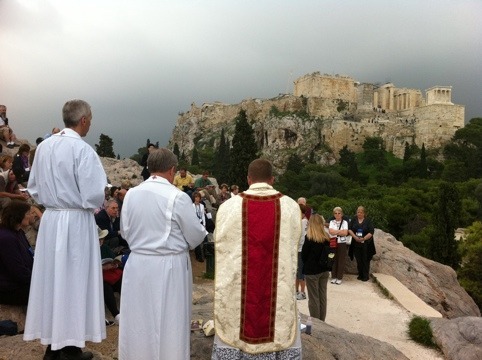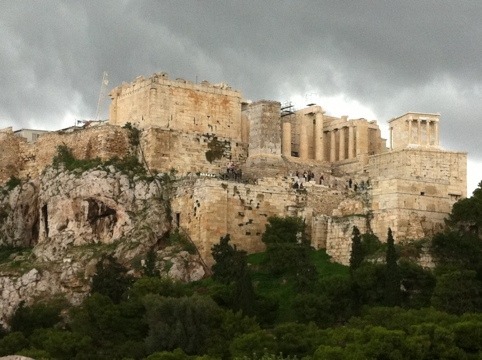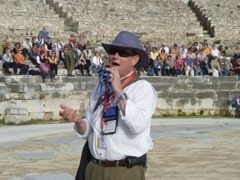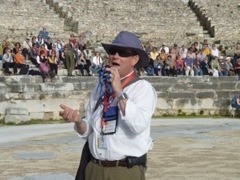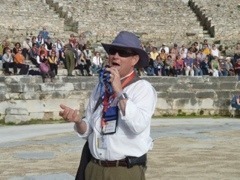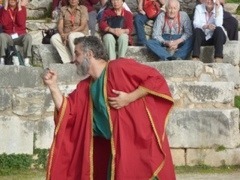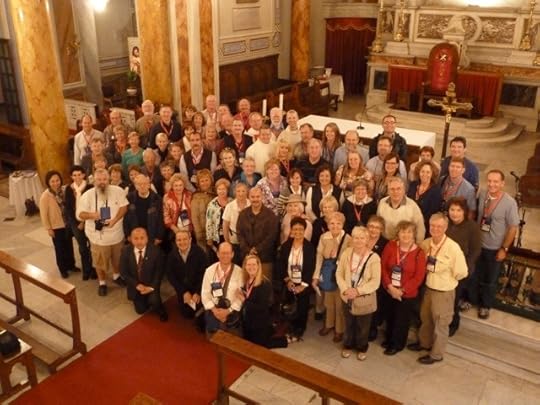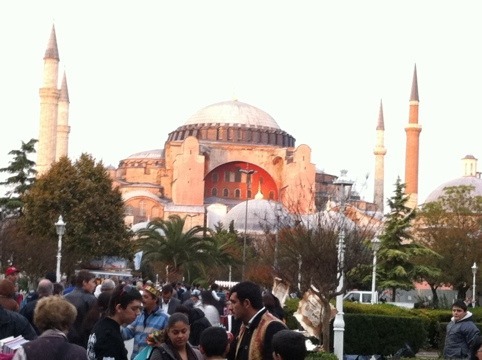Stephen K. Ray's Blog, page 511
November 12, 2010
With St. Paul in Athens
Today we disembarked from the Orient Queen and drove into Athens. It's always hard to pack and leave your cabin but we must move on.
We arrived at the famous Acropolis upon which still stands the Parthenon. We started first with Mass on top of the rocky hilltop called Mars Hill or the Areopagus where St. Paul some to the judges of the Areopagites.
We then scrambled up the Acropolis in the rain. After that the group split into two groups: 30 going home and 40 going on to Rome.
We took the bus to Patras where we boarded the Ionian Queen, an over night ferry to Pompeii. Stay tuned!
http://www.youtube.com/watch?v=VLyE8LxFbKw
Does John 3:16 Teach "Faith Alone"?
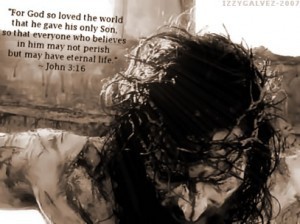 My mother asked me, "How would you like fifty cents?" I quickly responded, "I would like it very much." What a silly question to ask an seven year old. Of course I would like fifty cents. Fifty cents was a lot of money when I was a little boy. My mother continued, "Here is a Bible verse I want you to memorize, and when you can recite it perfectly, I will give you the money."
My mother asked me, "How would you like fifty cents?" I quickly responded, "I would like it very much." What a silly question to ask an seven year old. Of course I would like fifty cents. Fifty cents was a lot of money when I was a little boy. My mother continued, "Here is a Bible verse I want you to memorize, and when you can recite it perfectly, I will give you the money."
And that is how I first learned and memorized some of the most well-known passages of the Bible. I memorized all of Psalm 23, "The Lord is My Shepherd . . . " I learned Psalm 119:105, "Thy word is a lamp unto my feet, and a light unto my path," which was a constant reminder of the Bible's place of preeminence in my life, the sole rule of faith and practice.
Of course the most important verse to be memorized by any Evangelical Protestant child is John 3:16. It is a verse that encapsules the Gospel of Christ in one elegant and pregnant sentence, a sentence that reaches to the heart of God and explains the essence of history and salvation in twenty-five short words.
The key action words stand out with stark clarity: loved, gave, believe, perish, and have. We can possess (have) something because of God's act of love, and a response by man. The loving act of God in history, opened an otherwise locked and bolted door, providing man with an escape from damnation and an offer of eternal life.
For the whole article, click here.
November 11, 2010
Walking with St. Paul thru Thessaloniki & Berea
"The Bereans were more noble minded than the Thessalonians for they received Paul's word with eagerness searching the Scriptures daily to see if these things were so."
To we followed Paul's journeys through Thessaloniki and Berea which can be found in Acts 17.
Enjoy the short video http://www.youtube.com/watch?v=H7t8MPvm8lY
Enormity of the Universe
With St. Paul in Philippi
On Wednesday we landed back in Greece at the port of Kavala which is ancient Neapolis. This is where St. Paul first set foot on European soil.
We toured the ancient site of Philippi, was addressed by St. Paul and had Mass at the river where Paul baptized Lydia, his first European convert to Jesus Christ.
See video here http://www.youtube.com/watch?v=XA2sxNANktY
November 10, 2010
Protestants Changing Views on Mary
Since we are having Mass at Mary's House today in Ephesus, I thought I would share this article.
When I was an Evangelical I never recall hearing a sermon on Mary. To do so would put the pastor in danger of becoming a bit "Catholic." But, I hope those days are changing.
Here is an interesting news report from a while back but interesting reading. Seems that some Protestants are trying to find their roots, be balanced and are taking a new look at Mary.
Protestants find room in faith for Mary:This Christmas, growing numbers of Protestants are looking at the Virgin Mary in a new light.
BY ALEXANDRA ALTER
Growing up in a Lutheran church, the Rev. Roger Prehn rarely heard about the Virgin Mary, except during Christmas.
Now a pastor in Orlando, Prehn preaches in a sanctuary with a nearly life-size bronze statue of Mary and the baby Jesus. During advent, the four weeks leading up to Christmas, he leads his congregation in singing the Magnificat — a prayer Mary sings in the Gospel of Luke.
Until fairly recently, devotion to Mary would have caused a scandal in most Protestant churches. Many Protestants still reject Mary's exalted status within Catholicism and worry that honoring her will put her on par with Jesus. But in recent years a growing number of mainline Protestants and evangelicals have started to rethink their centuries-old opposition to revering Mary.
"We've ignored Mary, and now we're recovering her place in salvation history," said Prehn, pastor of St. Paul Lutheran Church.
This Christmas, many Protestants are looking at Mary in a new light, inspired in part by growing dialogue with Catholics, the influence of Latin American immigrants who bring strong religious traditions of honoring Mary and a recent explosion of Mary-themed books, websites, popular songs and movies such as The Passion of the Christ and The Nativity Story.
"Protestants and Catholics can agree that Mary was a great woman, a woman of faith and that she was the God bearer," said theologian Scot McKnight, author of The Real Mary: Why Evangelical Christians Can Embrace the Mother of Jesus. "You can talk about Mary for a long time before you have to ask whether she was immaculately conceived, sinless and perpetually a virgin."
While Catholics and Protestants still clash over Mary's role as a mediator between humanity and God, the devotion gap appears to be closing, said Timothy Matovina, director of the Cushwa Center for the Study of American Catholicism at the University of Notre Dame. Growing numbers of Hispanic converts to Protestantism have a strong connection to Mary that they carry over into their new denominations, Matovina said.
At the Church of the Redeemer, an Episcopal Church in Sarasota, congregants have celebrated the Virgin of Guadalupe's feast day as part of their Hispanic outreach for the past three years. Earlier this month, parishioners honored the patron saint of Mexico with a special Mass, an altar adorned with candles and an image of Guadalupe and a festival, said the Rev. Dick Lampert.
Bringing icons of Mary into Protestant settings has stirred controversy elsewhere. In Chicago, some members of a United Methodist Church caused an uproar when they placed a statue of Guadalupe in its sanctuary.
Mary's recent emergence as a pop culture icon has helped boost her appeal among Protestants, pastors and scholars say. This December, dozens of churches around the country held discussion groups about Mary tied to The Nativity Story, a New Line Cinema film that chronicles Jesus and Mary's journey to Bethlehem, and McKnight's book The Real Mary. Several South Florida congregations, including Calvary Chapel in Fort Lauderdale, Christ Fellowship in West Palm Beach and New Birth Baptist Church in Miami, attended advanced screenings for The Nativity Story.
Rick Reynolds, executive producer for the Active Word television programs at Calvary Chapel, said the film's version of Mary departed from earlier cultural images of her as meek and passive. "Here's a young woman who loved God and was willing to say, God, you chose me," he said.
Leaders of local Catholic organizations dedicated to Mary say they've seen growing devotion to the Virgin among both lay Catholics and Protestants.
Monique Telson, who lives in Davie and attends St. Bernadette's Catholic Church, said she hopes to help correct misconceptions about Mary. As a volunteer with the Legion of Mary, Telson visits retirement homes and prisons to talk to people about the benefits of praying to Mary. She said not only Catholics but Protestants, Jews and Muslims responded positively to her message. Muslims also honor Mary, who has an entire chapter in the Koran named after her.
"In following Mary, we learn to know Jesus more," Telson said.
Sister Juana Maria of the Servants of the Pierced Hearts of Jesus and Mary, a Catholic religious community in Miami, said many non-Catholics — including Baptists and Pentecostals — attend their weekly prayer services. Sometimes, newcomers express reservations about worshiping Mary, she said.
'There are those who will come with the question, `What's the basis of your faith to Mary? How is it that you can love Mary and not be unfaithful to God?' " she said.
That question has vexed Protestants for centuries. Mary's hallowed place in Christian theology became official doctrine in the 5th century, when a church council pronounced her "Theotokos," or Mother of God. But as Marian devotion grew more elaborate in the Middle Ages, some Christians began to worry that she was replacing Jesus. After the 16th century Protestant Reformation, Marian worship was shunned by non-Catholics and treated as a threat to Jesus' place as mankind's sole redeemer.
The theological gap between Protestant and Catholic views of Mary deepened in the 19th century, when the Catholic Church formally established the doctrine of Mary's immaculate conception — the belief that Mary herself, unlike other humans, was conceived without original sin. In 1950, the Catholic Church further elevated Mary when Pope Pius XII approved the doctrine of Mary's Assumption, or bodily ascent into heaven.
Most Protestants reject these beliefs, arguing that they confer a divine status on Mary that has no foundation in scripture. But at the same time, many Protestants have dismissed what the scriptures do say about Mary, says Beverly Gaventa, professor of New Testament literature at Princeton Theological Seminary and co-editor of Blessed One: Protestant Perspectives on Mary.
While Mary's part in the nativity story comes up at Christmas, few Protestants discuss her appearances in the Gospel of John, which describes how Mary urged Jesus to perform the miracle of turning water into wine, her triumphant song in the Gospel of Luke, or her place at the foot of the cross. There are more than 20 references to Mary in the New Testament, but these rarely come up in Protestant sermons, prayer circles or Bible studies, Gaventa said.
"Protestants who place such a high value on scripture have largely ignored them, except at Christmas time," she said. "Any interest in Mary was perceived to be kind of scandalous because Mary was Catholic."
Now many prominent theologians are now making the case for a Protestant "reappropriation" of Mary. Protestant publications and news organizations such as Christianity Today, the Associated Baptist Press and The Lutheran have all featured articles in recent months calling for Mary's restoration.
Some pastors and theologians have warned that elevating Mary too much could provoke another backlash among evangelicals who still hold deep reservations about worshiping Mary [Steve's note: Catholic do NOT worship Mary; we venerate her. Veneration and worship are NOT the same thing. We can venerate saints but we worship God alone]. But Notre Dame's Timothy Matovina argues that honoring Christ's mother has always been central to Christianity.
"By leaving her out," he said, "we're missing something that's integral to the faith."
November 9, 2010
Today in Istanbul!
Today we got to sleep in but I got up early to run. It is hard to run on a treadmill it's hard to do that when the ship is bobbing and swaying.
We had Mass at the Cathedral of the Holy Spirit, then everyone scattered for lunch in cages and restaurants before walking thru the wild Spice Market.
Then to the Hagia Sofia and the Blue Mosque where we learned about Islam. I gave my comments to — you'll see my thumbs down comment.
We're back on board having dinner and a free evening. Stay tuned for more.
View video here http://www.youtube.com/watch?v=is5zD1BwjII
Notre Dame Pays Price for Obama's Visit
After honoring President Barack Obama during last May's commencement ceremonies, the University of Notre Dame has seen less contributions and is feeling financial heat.
In May 2009, debate was heated over the fact that Notre Dame, a Catholic university, invited President Obama to speak at its graduation. It was controversial mainly because some of Obama's policies are contrary to church doctrine. Katie Walker of American Life League (ALL) tells OneNewsNow the school has paid a price.
"Notre Dame has come out $120 million short for the fiscal year in which President Obama spoke during commencement and received an honorary law degree," she reports.
She believes that staggering number is in direct response of alumni and others around the country who feel scandalized "that Notre Dame would host this man and give one of the most pro-abortion presidents in the nation's history an honorary law degree."
The pro-lifer points out that Obama "is a man whose philosophy of the law and philosophy of the country fundamentally is one that denies that all human beings deserve human rights," so she wonders, "Is this a man [one] that 'Our Lady's' university should be honoring and upholding and putting on a pedestal for her graduates?"
Walker feels the drop in funding should send a loud message to Notre Dame, which means "Our Lady."
Catholic Warrior: A Convert Story
From Pentecostal to Mormon to Catholic — to Iraq! Great story with pictures :-)
November 8, 2010
Why Can't Evangelicals See the Eucharist?
I was recently asked why Evangelicals cannot see the Eucharist and Real Presence in the Bible. This person said that when they read the Bible it seems so clear — especially John 6 where Jesus says "Unless you eat my Flesh and drink my Blood . . ." and at the Last Supper when he said, "This IS my flesh."
"Why is it so easy to see for me," she wrote, "while Evangelicals miss it?"
 There are a good number of explanations for this, but I tried to put it in simple terms. I responded:
There are a good number of explanations for this, but I tried to put it in simple terms. I responded:
"In answer to your question it all depends on what kind of glasses you are wearing. If you wear dark colored glasses you see things differently than if you wear clear or red shaded glasses. Every tradition, whether it is Catholic, Baptist, Mormon, or Lutheran has a tradition or grid through which they read and interpret the Bible. No one approaches the Bible objectively without any preconceived ideas or convictions.
"If one wears Baptist glasses and is convinced of the Baptist teaching, then they will see everything they read through their own Baptist ideas or tradition; they read their tradition into the text. Since they are told the Eucharist is only symbolic, they twist and tug to make Scripture fit their perspective.
"Also, as Evangelicals we (or at least I) was convinced the Catholic Church was wrong and we didn't even understand what they believed or the basis for it. I also didn't know that ALL Christians for the first 1500 years believed what Catholic's now teach. And that even now ALL Christians around the world believe in the Real Presence except for a very small sliver of the Christian pie — the Evangelicals, Fundamentalists and a few other newly invented groups.
"The Catholic also has a tradition which has been handed down from the apostles. We can trace it with full confidence back to Jesus himself. When we read the Bible we have on our Catholic glasses which enables us to understand the Scriptures the way the apostles wrote it and the early Church understood it. We trust Scripture and the Tradition and this tradition is that which was taught by the apostles (2 Cor 11:2; 2 Thess 2:15; 3:6).
Be proud, yet humble, to be Catholic!"
Stephen K. Ray's Blog
- Stephen K. Ray's profile
- 27 followers


